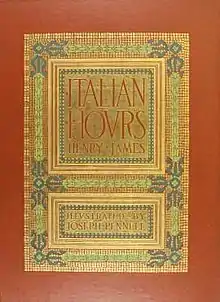Italian Hours
Italian Hours is a book of travel writing by Henry James published in 1909. The book collected essays that James had written over nearly forty years about a country he knew and loved well. James extensively revised and sometimes expanded the essays to create a more consistent whole. He also added two new essays and an introduction.
 First US edition | |
| Author | Henry James |
|---|---|
| Country | United Kingdom, United States |
| Language | English |
| Genre | Travel writing |
| Publisher | William Heinemann, London Houghton Mifflin Company, Boston |
Publication date | Heinemann: 28-Oct-1909 Houghton: 20-Nov-1909 |
| Media type | |
| Pages | Heinemann: 364 Houghton: 505 |
Summary and themes
Italian Hours ends with the phrase, "the luxury of loving Italy," and everything in the book indicates that James enjoyed this luxury to the fullest. But he was by no means a blind lover. His opening essay on Venice, for instance, doesn't gloss over the sad conditions of life for the city's people: "Their habitations are decayed; their taxes heavy; their pockets light; their opportunities few."
Still, James goes on to sketch enough of the beauty of Venice to make it seem a fair compensation. Throughout the book he constantly comes back to the beauty and amenity of Italian life, despite the all too frequent material shortcomings. Venice and Rome get the most extended treatment, but James doesn't neglect the rest of the country. His Roman essays, though, show the strongest touch of his own experiences, especially his long rides on horseback through the Campagna and his many walks through various neighborhoods in the city.
Table of contents
|
Critical evaluation
Few critics have put up much of a struggle against the charm of Italian Hours, the most loving of all James' travel writings. The book is justly valued for its deep appreciation of Italian people, places and art. Although there are inevitable stylistic variations from the earlier essays to the latest, the unevenness hardly spoils the reader's enjoyment and may even add some welcome variety. Writing in The New York Times, critic Adam Begley writes that "the spectacle of Henry James morphing into a lazy, contented, 'uninvestigating' tourist... gives [Italian Hours] a very satisfactory narrative arc." [1]
In The Golden Bowl Maggie relates a pretty image of Amerigo's: "He called it a 'serenade,' a low music that, outside one of the windows of the sleeping house, disturbed his rest at night... when finally, rising on tiptoe, he had looked out, he had recognised in the figure below with a mandolin, all duskily draped in her grace, the raised appealing eyes and the one irresistible voice of the ever-to-be-loved Italy." James could never resist the voice, either.
References
Bibliography
- Begley, Adam (24 June 2010). "Henry James Walked Here". New York Times (Travel). Retrieved 16 July 2018.
- Henry James Collected Travel Writings - The Continent - A Little Tour in France, Italian Hours, Other Travels edited by Richard Howard (New York: Library of America 1993) ISBN 0-940450-77-1
External links
| Wikisource has original text related to this article: |
| Wikimedia Commons has media related to Italian Hours. |
- Original magazine publication of the essay Venice (1882)
- Original magazine publication of the essay The Grand Canal (1892)
- Original magazine publication of the essay The Old Saint-Gothard under the title An Autumn Journey (1872)
- Original magazine publication of the essay Italy Revisited (1878)
- Original magazine publication of the essay A Roman Holiday (1873)
- Original magazine publication of the essay Roman Rides (1873)
- Original magazine publication of the essay Roman Neighborhoods (1873)
- Original magazine publication of the essay From a Roman Note-Book (1873)
- Original magazine publication of the essay A Chain of Cities under the title A Chain of Italian Cities (1874)
- Original magazine publication of the part one of the essay Siena Early and Late under the title Siena (1874)
- Note on the text of Italian Hours at the Library of America web site
- Italian Hours at Project Gutenberg